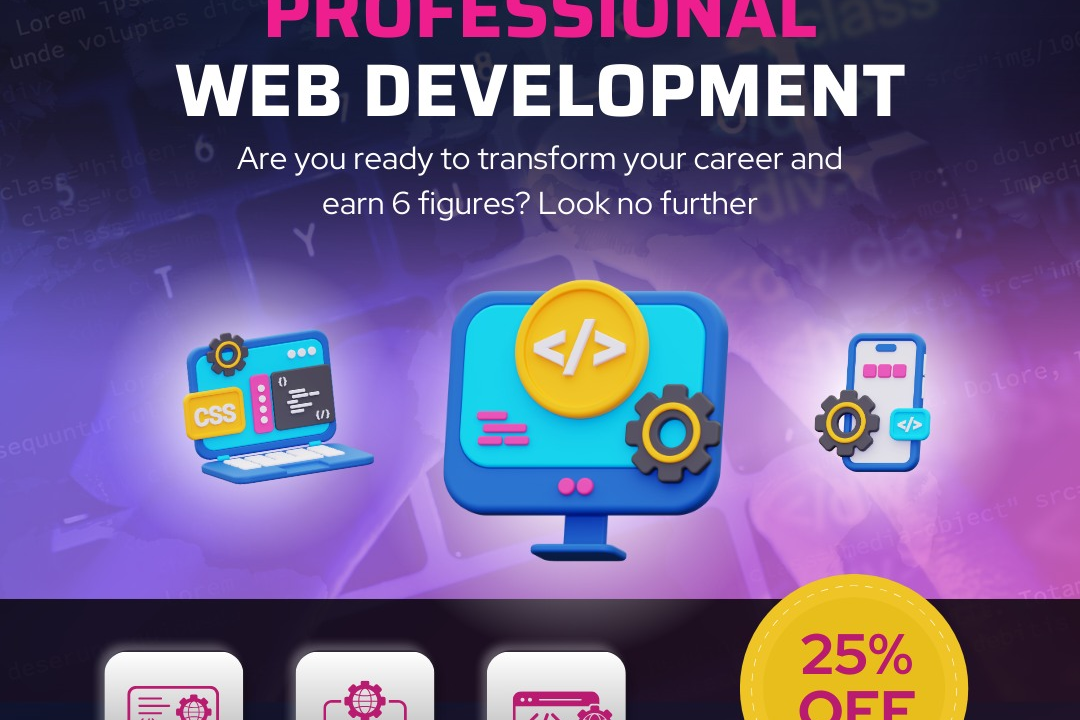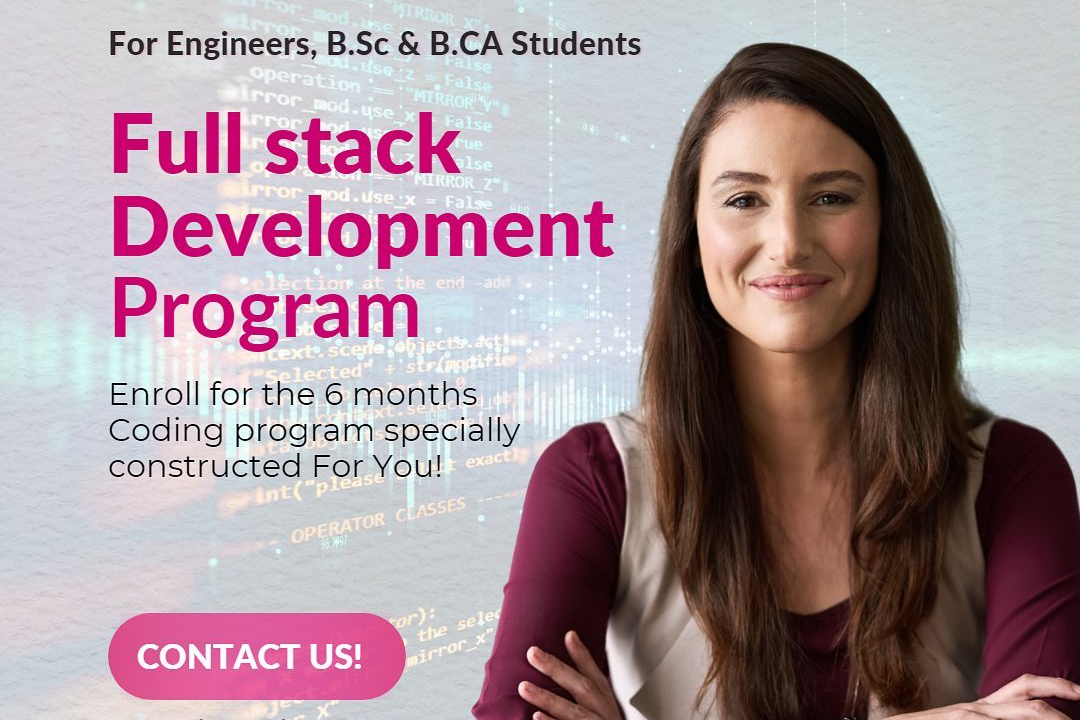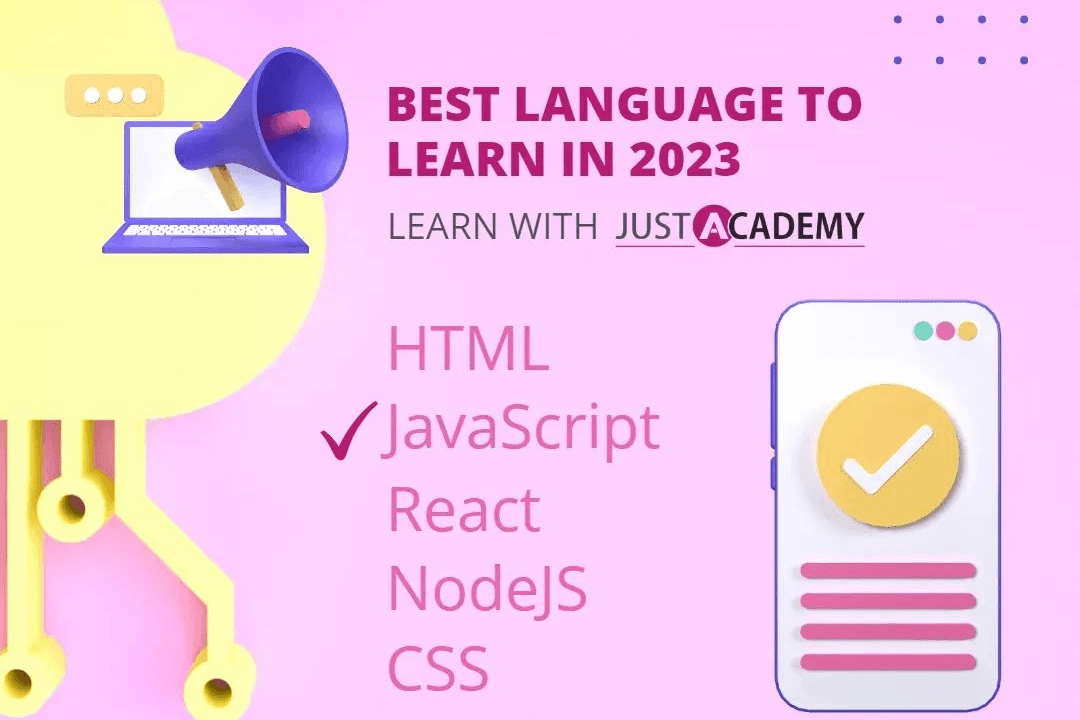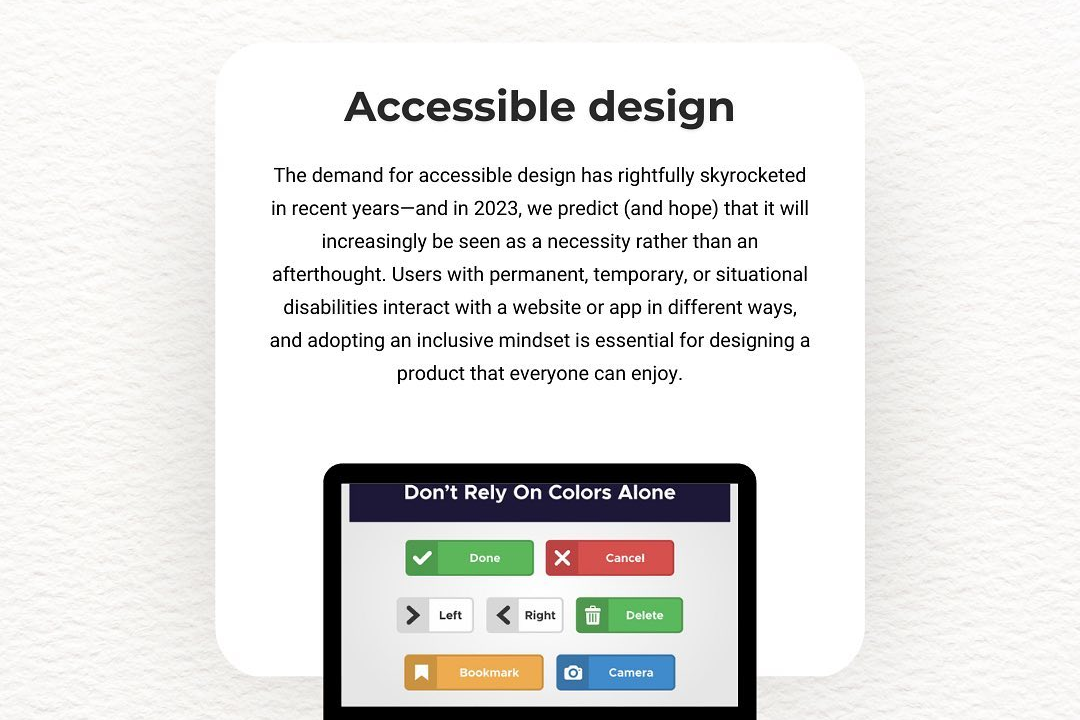Facebook Programming Language PHP
PHP (Hypertext Preprocessor) is a popular open-source scripting language primarily used for web deve
Facebook Programming Language PHP
PHP (Hypertext Preprocessor) is widely used for developing dynamic websites and web applications due to its server-side scripting capabilities. Its integration with Facebook's platform makes it especially valuable for creating social media-oriented applications, enabling developers to easily connect with Facebook’s features such as user authentication, social sharing, and posting. PHP's simplicity, open-source nature, and vast community support help streamline development processes, making it an essential tool for building scalable, interactive, and engaging Facebook-related applications and services.
To Download Our Brochure: https://www.justacademy.co/download-brochure-for-free
Message us for more information: +91 9987184296
PHP (Hypertext Preprocessor) is widely used for developing dynamic websites and web applications due to its server side scripting capabilities. Its integration with Facebook's platform makes it especially valuable for creating social media oriented applications, enabling developers to easily connect with Facebook’s features such as user authentication, social sharing, and posting. PHP's simplicity, open source nature, and vast community support help streamline development processes, making it an essential tool for building scalable, interactive, and engaging Facebook related applications and services.
Course Overview
The ‘Facebook Programming Language PHP’ course provides comprehensive training in PHP for developing dynamic Facebook applications, integrating social features, and leveraging Facebook APIs. Students will learn PHP fundamentals, Facebook SDKs, and real-time project development to create interactive social media tools and solutions efficiently.
Course Description
The ‘Facebook Programming Language PHP’ course offers a focused introduction to PHP for Facebook app development, covering core PHP concepts, Facebook SDK integration, and real-world project implementation to build interactive social media applications efficiently.
Key Features
1 - Comprehensive Tool Coverage: Provides hands-on training with a range of industry-standard testing tools, including Selenium, JIRA, LoadRunner, and TestRail.
2) Practical Exercises: Features real-world exercises and case studies to apply tools in various testing scenarios.
3) Interactive Learning: Includes interactive sessions with industry experts for personalized feedback and guidance.
4) Detailed Tutorials: Offers extensive tutorials and documentation on tool functionalities and best practices.
5) Advanced Techniques: Covers both fundamental and advanced techniques for using testing tools effectively.
6) Data Visualization: Integrates tools for visualizing test metrics and results, enhancing data interpretation and decision-making.
7) Tool Integration: Teaches how to integrate testing tools into the software development lifecycle for streamlined workflows.
8) Project-Based Learning: Focuses on project-based learning to build practical skills and create a portfolio of completed tasks.
9) Career Support: Provides resources and support for applying learned skills to real-world job scenarios, including resume building and interview preparation.
10) Up-to-Date Content: Ensures that course materials reflect the latest industry standards and tool updates.
Benefits of taking our course
Functional Tools
1 - PHP Integrated Development Environment (IDE): Students learn to use popular IDEs like PhpStorm, Visual Studio Code, or Sublime Text for writing, debugging, and managing their PHP code efficiently. These environments provide features such as syntax highlighting, code completion, version control integration, and debugging tools, which streamline the development process and enhance productivity. Mastering an IDE allows learners to write clean, organized, and error free code, essential for building scalable Facebook PHP applications. The course covers setup, customization, and best practices for using these tools in real world projects. Familiarity with the IDE also helps in collaboration, code reviews, and efficient troubleshooting, making students industry ready.
2) Facebook SDK for PHP: This official Facebook Software Development Kit simplifies the integration of Facebook's features into PHP applications. It provides pre built libraries and APIs to access Facebook Graph API, handle authentication, publish content, and fetch user data seamlessly. Students are guided on how to install, configure, and utilize the SDK to develop robust applications that interact smoothly with Facebook's platform. Understanding this tool is fundamental for implementing features such as login, sharing, and analytics within Facebook integrated PHP apps.
3) Version Control Tools (Git/GitHub): Version control systems like Git, combined with hosting platforms such as GitHub, are essential for managing code changes, collaboration, and maintaining project history. The course teaches students how to initialize repositories, commit changes, branch, merge, and resolve conflicts. These skills enable learners to work efficiently in teams, revert to previous versions if needed, and keep their projects organized. GitHub integration also encourages collaboration and code review, which are common in professional development environments.
4) Local Server Environments (XAMPP, WAMP, MAMP): Students utilize local server setups to develop and test PHP applications locally before deployment. These pre configured environments include Apache server, MySQL database, and PHP interpreter, providing a portable and ready to use web server environment on their computers. The course guides learners through installation, configuration, and usage to create a development setting that mimics live server conditions, facilitating debugging and iterative testing of Facebook PHP applications.
5) Database Management Tools (phpMyAdmin, MySQL Workbench): Managing data is crucial for dynamic applications. The course introduces students to tools like phpMyAdmin and MySQL Workbench for creating, modifying, and querying databases. They learn to design database schemas, optimize queries, and ensure data security while integrating with Facebook PHP apps. Mastery of these tools enables the development of feature rich applications that store user and application data effectively.
6) Front End Technologies (HTML, CSS, JavaScript): While primarily focused on PHP, the course also emphasizes frontend tools to create engaging user interfaces. Students learn to embed PHP within HTML, style pages with CSS, and add interactivity using JavaScript. This knowledge is vital for developing responsive and visually appealing Facebook applications that offer a seamless user experience across devices.
7) API Testing Tools (Postman): Postman helps students test Facebook Graph API endpoints and other RESTful services during development. They learn to send requests, handle responses, and troubleshoot API integrations efficiently. This tool accelerates the development cycle by allowing for quick testing and validation of API calls, ensuring the application's reliability and correctness.
8) Authentication Libraries (OAuth2, Facebook SDK Authentication Module): Handling user authentication securely is central to Facebook app development. The course covers various libraries and modules that simplify OAuth2 implementation, enabling users to log in with their Facebook credentials. Students understand how to integrate these libraries to authenticate users, manage sessions, and secure data exchanges, adhering to best security practices.
9) Command Line Tools and Bash Scripting: Developers are trained to use command line interfaces for version control, environment setup, and deployment tasks. Bash scripting automates repetitive processes such as database backups, code deployment, and environment configuration, improving workflow efficiency and reducing errors during development and deployment phases.
10) Debugging and Profiling Tools (Xdebug, Chrome DevTools): Debugging is an integral part of coding. Students learn to use tools like Xdebug for PHP error tracking, stack tracing, and performance profiling. Coupled with browser tools like Chrome DevTools, these utilities help identify bottlenecks, fix bugs, and optimize the application’s performance, ensuring a smooth user experience and high quality code.
11 - Continuous Integration / Continuous Deployment (CI/CD) Tools (Jenkins, GitHub Actions): The course introduces students to automating their build, testing, and deployment workflows. Using CI/CD pipelines minimizes manual errors, accelerates delivery, and ensures code quality through automated testing and deployment processes tailored for Facebook PHP applications. This prepares learners for modern DevOps practices crucial in scalable project management.
12) Security Best Practices and Tools: Security is paramount when developing applications that interact with social media platforms. Students learn to implement secure coding practices, utilize tools for vulnerability scanning, and integrate authentication mechanisms such as HTTPS, data encryption, and input validation. The course emphasizes safeguarding user data and preventing common threats like SQL injection, cross site scripting (XSS), and CSRF attacks.
13) Cloud Hosting Platforms and Deployment (AWS, Azure, DigitalOcean): After development, deployment on the cloud is essential for scalability and reliability. The course explores integrating Facebook PHP applications with cloud services, setting up virtual servers, managing domains, SSL certificates, and continuous deployment strategies. This knowledge enables students to launch their projects on robust and scalable cloud environments.
14) Monitoring and Analytics Tools (Google Analytics, Facebook Insights): To optimize user engagement, the course covers integrating analytics tools into Facebook PHP applications. Students learn how to track user behavior, monitor application performance, and generate reports, facilitating data driven decision making for application enhancement.
15) Payment Gateway Integration (PayPal, Stripe): Many Facebook applications require monetization features. The training includes implementing secure payment gateways, managing transactions, and handling user billing within PHP applications. This enables learners to build commerce ready Facebook apps.
16) Responsive Design Principles and Frameworks (Bootstrap, Tailwind CSS): Ensuring applications are mobile friendly is critical. The course shows how to incorporate frontend frameworks to develop responsive interfaces that adapt seamlessly across devices, improving user experience within Facebook and external web pages.
17) Cross Browser Compatibility Testing: Students learn techniques and tools to ensure their applications function correctly across different browsers and devices. This step is vital for maintaining consistent user experience and fixing compatibility issues.
18) Server Management and Optimization: Beyond setup, the course covers server tuning, load balancing, caching strategies, and database optimization to enhance application performance and scalability, especially under high traffic when integrated with Facebook applications.
19) Legal and Compliance Knowledge (GDPR, Data Privacy Laws): The course educates students on legal considerations related to user data privacy, Facebook policies, and data protection laws, ensuring their Facebook PHP applications are compliant and trustworthy.
20) Custom Facebook App Development and Permissions Management: In depth training on creating custom Facebook apps, managing permissions, app review processes, and adhering to Facebook's platform policies prepares students to develop compliant, high functioning Facebook integrations.
21 - Real Time Communication Technologies (WebSockets, Firebase): For interactive applications, students explore implementing real time features such as chat, notifications, or live updates within Facebook PHP apps using websocket protocols or Firebase integration.
22) Packaging and Distribution of PHP Applications: The course guides on how to package Facebook PHP applications for deployment, creating installers or containerized environments using Docker, ensuring smooth distribution and deployment in different environments.
23) Data Migration and Backup Strategies: The course teaches safe data handling practices, including data migration between servers or databases and establishing backup solutions to prevent data loss during development or deployment.
24) Content Management Systems (CMS) Integration: Students learn how to extend or integrate popular CMS platforms with Facebook PHP applications, facilitating easier content management and user engagement.
25) Social Media Marketing and SEO Strategies: Beyond technical development, the course covers how to optimize Facebook apps for marketing, improving visibility, engagement, and growth metrics through SEO and social media best practices.
26) Multilingual and Localization Support: Training on developing Facebook PHP applications that support multiple languages and regional settings to cater to global audiences, expanding application reach.
27) Multi Platform Development Approaches: The course explores strategies for developing Facebook applications compatible across various devices such as mobiles, tablets, and desktops, ensuring a consistent experience.
28) Documentation and Code Standards: Emphasizing best practices for writing maintainable, readable code with proper documentation, which is essential for collaboration, future updates, and professional development.
29) Collaboration with Designers and Frontend Developers: The course encourages interdisciplinary teamwork by teaching how to effectively communicate and integrate designs and frontend functionalities into PHP applications.
30) Portfolio Projects and Certification: As part of hands on learning, students create comprehensive projects that demonstrate their mastery of Facebook PHP development. Successful completion leads to certification, enhancing employability and freelance opportunities.
Browse our course links : https://www.justacademy.co/all-courses
To Join our FREE DEMO Session:
This information is sourced from JustAcademy
Contact Info:
Roshan Chaturvedi
Message us on Whatsapp:
Email id: info@justacademy.co












